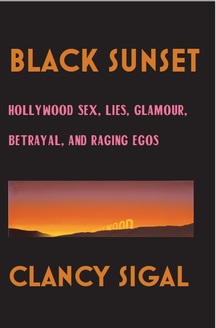|
This riveting, poignant and hilarious memoir recounts Clancy Sigal’s escapades as a young agent, handling screenwriters and actors at the
Sam Jaffe Agency in the blacklist-addled Hollywood of the 1950s. He’s hired by the take-no-prisoners agent Mary Baker after being fired from Columbia Pictures for using the mimeograph machine to copy radical leaflets. Atom bomb tests in the desert light up the night sky, and everyone is either naming names or getting named. As the point person of a small circle of anarchistic oddballs, Clancy is constantly dogged by the FBI. But he spends his days going from studio to studio, trying to promote his clients Jack Palance, Peter Lorre, Humphrey Bogart, Barbara Stanwyck, and many others. Clancy’s style is rip-roaring — headlong, ribald, wiseass. Black Sunset belongs to a hardboiled school that also includes Raymond Chandler and Elmore Leonard. This is a once-in-a-lifetime tale of Hollywood drama and excess, from a legendary entertainment industry insider. Order from Counterpoint here. |
The Backlist
Open Road Media publishes most of my backlist, now available in ebook: Going Away, The Secret Defector, Weekend In Dinlock, A Woman of Uncertain Character, and Zone of the Interior.
Hemingway Lives! Why Reading Ernest Hemingway Matters Today is available from OR Books.
Hemingway Lives! Why Reading Ernest Hemingway Matters Today is available from OR Books.
Hemingway Lives! (2013)
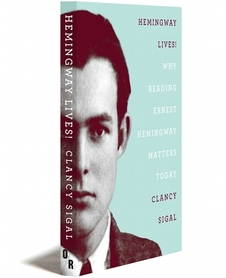
Hemingway Lives! is my take on Ernest Hemingway.
It's everything you ever want or need to know about America's most famous writer in one handy book to be used by a general reader or as a classroom text. Despite the existing mountain of Hemingway material, I start from scratch and assume nothing in my ideal reader except an open mind. I examine the he-man legends, his wars, his politics (which most previous writers like to steer clear of), his real-life and fictional women who usually get a bad press. (All those "bitch heroines" including the mother he was supposed to hate.) You may love or hate Hemingway, or had to suffer him in an English Lit class, or think you know him from Woody Allen's Midnight in Paris or the HBO movie about him and Martha Gellhorn. It's so often a kiss of death when a teacher puts Hemingway on a "must read to pass this course" list or demands that we search for "symbols." You should hear what Ernest had to say about symbols!
I aim to rescue Hemingway from his cliches.
Order from OR Books here.
It's everything you ever want or need to know about America's most famous writer in one handy book to be used by a general reader or as a classroom text. Despite the existing mountain of Hemingway material, I start from scratch and assume nothing in my ideal reader except an open mind. I examine the he-man legends, his wars, his politics (which most previous writers like to steer clear of), his real-life and fictional women who usually get a bad press. (All those "bitch heroines" including the mother he was supposed to hate.) You may love or hate Hemingway, or had to suffer him in an English Lit class, or think you know him from Woody Allen's Midnight in Paris or the HBO movie about him and Martha Gellhorn. It's so often a kiss of death when a teacher puts Hemingway on a "must read to pass this course" list or demands that we search for "symbols." You should hear what Ernest had to say about symbols!
I aim to rescue Hemingway from his cliches.
Order from OR Books here.
Weekend in Dinlock (1961)
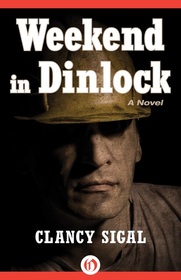
Weekend in Dinlock is my first book. It was written at white heat, over two weekends. I owe my writing life to a Yorkshire miner named Len Doherty who opened his heart, and his village (Thurcroft) to me.
At the time there were over half a million miners like Len in the "socialized" coal industry. Conservative and Labour governments cooperated to kill the mining industry; militant miners frightened the Establishment. The death of coal also means the scattering and loss of Britain's traditional shock troops of social progress--its pit men--precisely what Mrs. Thatcher and Tony Blair intended.
…this brawling, dead-accurate anatomy of a Yorkshire coal mining village…(an) affectionate feel for the vulnerable human tenderness that lurks beneath the crude, boastful, maudlin men who go down to the pits…” -- Christian Science Monitor
"A remarkable achievement... authentic as the coal dust in the mine." -- Times Literary Supplement
At the time there were over half a million miners like Len in the "socialized" coal industry. Conservative and Labour governments cooperated to kill the mining industry; militant miners frightened the Establishment. The death of coal also means the scattering and loss of Britain's traditional shock troops of social progress--its pit men--precisely what Mrs. Thatcher and Tony Blair intended.
…this brawling, dead-accurate anatomy of a Yorkshire coal mining village…(an) affectionate feel for the vulnerable human tenderness that lurks beneath the crude, boastful, maudlin men who go down to the pits…” -- Christian Science Monitor
"A remarkable achievement... authentic as the coal dust in the mine." -- Times Literary Supplement
Going Away (1962)
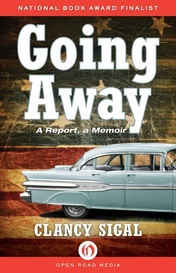
Going Away, a National Book Award runner up, is the On The Road Jack Kerouac might have written if he'd been a radical. It has gone into several editions. I like this particular cover.
“This is the most exciting book by a new American writer that I have read for a long time.” -- Alfred Kazin
“There hasn’t been anything like it since Grapes of Wrath.” -- San Francisco Chronicle
“Going Away, is a primer for the Occupy generation about the futility of despair and the inevitability of change.” -- Tablet
“This is the most exciting book by a new American writer that I have read for a long time.” -- Alfred Kazin
“There hasn’t been anything like it since Grapes of Wrath.” -- San Francisco Chronicle
“Going Away, is a primer for the Occupy generation about the futility of despair and the inevitability of change.” -- Tablet
Zone of the Interior (1976)
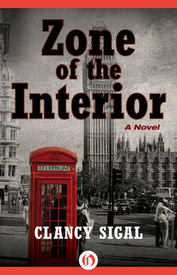
Zone of the Interior is “the book they dared not publish” in Britain. Left and right establishments united to ban it. It’s a broadly comic novel (very) loosely based on my experience with therapeutic communities, schizophrenic people and their loony doctors. An English "One Flew Over The Cuckoo’s Nest".
“Hilarious and terrifying.” -- New York Times
“One of the best books about our recent history that we have had.” -- Washington Post
“Hilarious and terrifying.” -- New York Times
“One of the best books about our recent history that we have had.” -- Washington Post
The Secret Defector (1992)
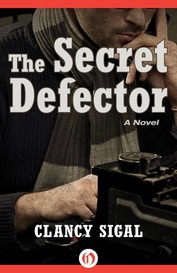
The Secret Defector is my "goodbye book" to England. Partly about people like me who "defect" from the working-to the middle-class and find themselves without a compass.
“Sex, politics, the FBI…a real joyride.” -- Studs Terkel
“…a passionate novel, full of love affairs and political confrontations…” -- David Ulin, Los Angeles Times
“…raucous, hard boiled…” -- Library Journal
“Sex, politics, the FBI…a real joyride.” -- Studs Terkel
“…a passionate novel, full of love affairs and political confrontations…” -- David Ulin, Los Angeles Times
“…raucous, hard boiled…” -- Library Journal
A Woman of Uncertain Character (2007)
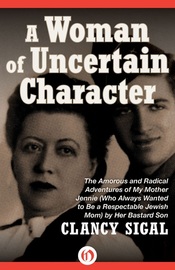
"Voluptuous redhead Jennie Persily was a stylish Russian-Jewish American labor organizer (and single mother) who could outsmart and stare down the toughest Chicago cops and southern sheriffs. Sigal, who tags himself as a "Flapper Age hootchy-kootchy speakeasy baby," and who became blacklisted in the McCarthy era, accompanied his brave, zealous mother all across the South during the 1930s as she took on the dangerous work of organizing black women workers, then held his own in Chicago's tough Jewish neighborhood known with all due hilarity as the Great Vest Side. A buddy of Studs Terkel, Sigal has a truly revelatory story to tell, and he writes with pizzazz and sensitivity, sounding like a blend of Mark Twain (he always wanted to be Huck Finn), Saul Bellow, and Stuart Dybek as he remembers the harsh demands of the Depression, his radical mother's resourcefulness and strength, and the escapades of his fellow "street yids," all the while offering a rare inside view of the revolutionary American labor movement. His rough-and-tumble coming-of-age stories are rife with pain, humor, and a gritty beauty, while Jennie emerges as a force of nature: bountiful, righteous, volatile, and indomitable."--*Starred Review*, Booklist
“…a lot of fun…a terrific story about growing up poor and on the left…” -- Jon Wiener
“…Sigal's intense attachment to his fast-talking, redhaired, sexy, unwed mother Jennie… and his roaring Oedipal rivalry with his mostly absent father Leo who carries a gun to social occasions.” -- Grumpy Old Bookman
“…a lot of fun…a terrific story about growing up poor and on the left…” -- Jon Wiener
“…Sigal's intense attachment to his fast-talking, redhaired, sexy, unwed mother Jennie… and his roaring Oedipal rivalry with his mostly absent father Leo who carries a gun to social occasions.” -- Grumpy Old Bookman
